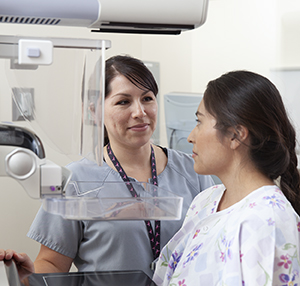Mammography with Breast Implants
Mammography is an X-ray of your breast tissue. The image that it makes is called a mammogram. A mammogram can help find problems in your breasts, such as cysts or cancer. Breast implants can interfere with taking and reading mammograms. Special methods must be used to get the best image. A mammogram is done by a technologist who is specially trained in doing this exam.

Before your test
-
Make sure the clinic gets your last mammogram and any other imaging exams of your breast, if they were done somewhere else. The healthcare provider is then able to compare past imaging exams with your current mammogram.
-
On the morning of your test, don't use deodorant, powder, or perfume.
-
Schedule the test for 1 week after your period. Your breasts are less tender then.
-
Tell your healthcare provider that you have breast implants when you schedule your exam.
-
Wear a top you can remove easily.
Arriving for your test
Remind your technologist that you have breast implants.
Also tell the technologist if you:
-
Are breastfeeding
-
Are pregnant or think you may be pregnant
-
Have had a breast biopsy or surgery
-
Have moles on or near your breasts
During your test
-
You will need to undress from the waist up.
-
The technologist will position each breast to get the best results. The technologist will take your implants into account when positioning your breasts. Implants may be moved aside. This helps make sure that as much breast tissue as possible can be seen on the mammogram.
-
Each of your breasts will be squeezed (compressed). Extra views of each breast, called push back views, will be done. These help to give the best view of your breast tissue, which can be hidden by your implants. The technologist will take care not to break your implants. It's rare that implants are damaged during a mammogram.
After your test
-
The technologist may have you wait a few minutes to be sure the images are readable.
-
More X-rays or other imaging exams, such as breast ultrasound, are sometimes needed. You may be able to have them done at the same time of your current appointment. Or you will have to schedule them if they are needed.
-
You should receive your test results in writing. Ask about this at your appointment.
Things to know
-
Be sure you know how your breasts and implants normally look and feel. This will help you notice any changes. Report changes to your healthcare provider as soon as possible.
-
Have screening mammograms and professional breast exams as often as your healthcare provider advises.
Online Medical Reviewer:
Neil Grossman MD
Online Medical Reviewer:
Raymond Turley Jr PA-C
Online Medical Reviewer:
Tara Novick BSN MSN
Date Last Reviewed:
11/1/2022
© 2000-2025 The StayWell Company, LLC. All rights reserved. This information is not intended as a substitute for professional medical care. Always follow your healthcare professional's instructions.